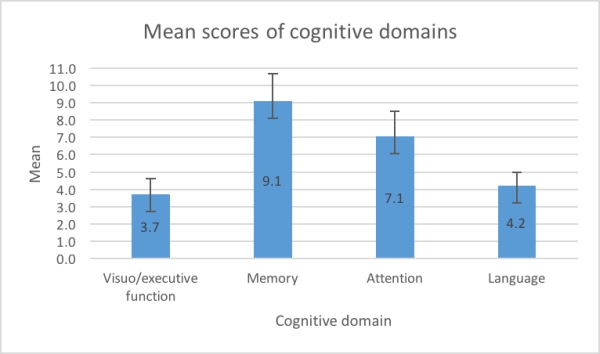Cognition and Self-Management in Liver Transplant Recipients
D. Ko,1 L. Bratzke,2 R. Muehrer.2
1Vanderbilt University, Nashville
2University of Wisconsin-Madison, Madison.
Meeting: 2018 American Transplant Congress
Abstract number: 378
Keywords: Outpatients, Psychosocial
Session Information
Session Name: Concurrent Session: Psychosocial and Treatment Adherence
Session Type: Concurrent Session
Date: Monday, June 4, 2018
Session Time: 4:30pm-6:00pm
 Presentation Time: 4:30pm-4:42pm
Presentation Time: 4:30pm-4:42pm
Location: Room 3AB
Cognitive impairment in the liver transplant (LT) population could negatively affect one's ability to self-manage. This study examined cognition and its relationship with self-management in the LT population. We hypothesized that global cognition and specific cognitive domains would be related to self-management.
This cross-sectional study included adult LT recipients who had a functioning transplant for at least six months. The 30-item Montreal Cognitive Assessment (MoCA) assessed cognition. Scores range from 0 to 30, higher scores indicate higher levels of global cognition. The MoCA test was then differentiated into domains (Visuospatial/Executive functioning, Memory, Attention, and Language), based on work by Vogel et al. (2015). The 40-item Health Education Impact Questionnaire and Basel Assessment of Adherence with Immunosuppressive Medication Scale were used to assess self-management. Self-management was classified as low, medium, and high using latent profile analysis. Logistic analysis was used to examine the relationships between cognition and three levels of self-management.
A total of 113 LT recipients (mean age 61.2 ± 11.1, 7.8 ± 6.4 years post-transplant, 62% male, and 94% White) participated in this study. MoCA scores were 24.4 ± 3.1, indicating mild cognitive impairment. Mean scores of four cognitive domains are presented in Figure 1.  Global cognition was not related to self-management. Among the four cognitive domains, memory was significantly related to high level of self-management (OR 2.32, 95% CI 1.52-3.53, p<.001).
Global cognition was not related to self-management. Among the four cognitive domains, memory was significantly related to high level of self-management (OR 2.32, 95% CI 1.52-3.53, p<.001).
This study found that LT recipients have a mild cognitive impairment and those who demonstrate better memory function are more likely to have a high level of self-management. Clinicians should regularly assess cognition of recipients and caregiver's participation in self-management for those with impaired cognition, especially memory deficits. Future studies should explore potential mechanisms of cognitive impairment to design interventions to ameliorate or compensate for the cognitive impairment. Limitations of this study include small sample size recruited at a single center, use of single measure of cognition.
CITATION INFORMATION: Ko D., Bratzke L., Muehrer R. Cognition and Self-Management in Liver Transplant Recipients Am J Transplant. 2017;17 (suppl 3).
To cite this abstract in AMA style:
Ko D, Bratzke L, Muehrer R. Cognition and Self-Management in Liver Transplant Recipients [abstract]. https://atcmeetingabstracts.com/abstract/cognition-and-self-management-in-liver-transplant-recipients/. Accessed February 15, 2026.« Back to 2018 American Transplant Congress
